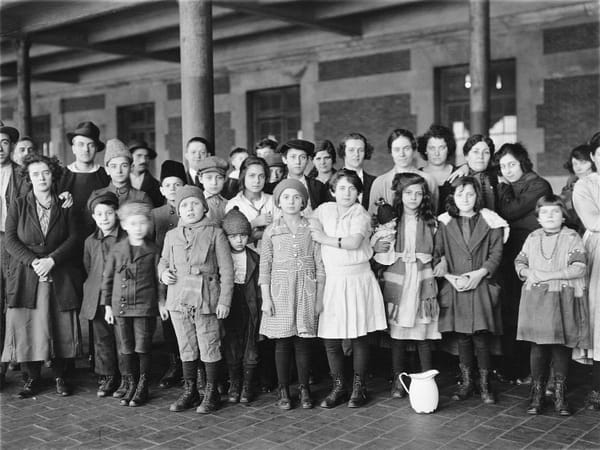Unfriendly Skies
Price fixing and employment discrimination before airline deregulation.

I recently viewed an American Experience episode on the history of flight attendants (formerly called “stewards” and “stewardesses”) in United States aviation. The episode traced the development of the overwhelmingly female, hence, stewardess role from a sort of nurse attendant in the 1930s when low-altitude flights were often uncomfortably turbulent, to a dutiful “domestic servant” role in the 1940s and '50s once pressurized cabins allowed flights to be longer and more pleasant, to sex object in the 1960s and early '70s as cultural mores shifted in a more permissive direction.
A throughline of the episode was that the stewardess role presented a double-edged sword for many women. On the one hand, it allowed them the opportunity for financial independence and travel to many exotic locations they may not have otherwise seen in their lifetimes. On the other hand, industry executives placed onerous restrictions on who could qualify for and remain in these roles. Women were often required to maintain a certain weight depending on their height, and exceeding this weight could bring probation or even dismissal. Many airlines expected them to be single since married stewardesses could be less appealing to the largely male clientele. Likewise, many were required to leave their jobs by 32, again on the rationale that male clientele would not be as attracted to women past that age.
Gender and sexual stereotypes were clearly the norm rather than exception with this role. Even worse, Black women were all but informally excluded from stewardess jobs prior to the Civil Rights Act of 1964.
The second half of the episode highlights how a combination of legislation, unionized activism, and court rulings changed the racist, sexist, and heteronormative status quo. Groups such as the National Organization for Women and offices like the Equal Employment Opportunity Commission were touted as allies in winning victories for flight attendants. Courts determined that the main role of a flight attendant was to guard the safety of passengers and other crew. That this may not have seemed an obvious role is a testament to how safe flying had become. Although it can be difficult to prove racial or sexual discrimination, the court’s focus on proficiency at maintaining a safe flight environment—skills that a potential stewardess could demonstrate in training school—also made it more difficult for employers who discriminated on the basis of race or physical attractiveness to otherwise claim some legitimate reason as an excuse.
Interestingly, the episode also mentions twice in passing that flight prices were fixed during this era, and how that may have had something to do with the incentive to objectify and racially discriminate against stewardesses. The amateur economist in me wishes they had explored this aspect rather than just focus on political action, so I’ll do that here. In fact, I would argue that two major theories of freedom are at work in this story. The civil rights perspective sees freedom from discrimination, with politically enforced equality for flight attendants, as the primary driver of change. A libertarian, by contrast, would tend to identify the breaking of the airline oligopoly as at least equally important and would emphasize greater economic liberty as the key driver for addressing such social inequalities. The reality, we’ll see, is that both likely contributed and, perhaps most importantly, the two approaches are not philosophically opposed to one another.
What might explain the connection between price fixing and employment discrimination? Airlines had to compete over the qualitative nature of what they offered passengers since prices were fixed. Options might include complimentary food and drinks, more legroom, or a higher number of bags allowed. Given the logistical limits to many of these options, and the large affluent male client base, the “quality” of the stewardess became the focus. Some airlines tried to require stereotypical and gendered notions of beauty for their stewardesses because that customer base (allegedly) preferred it that way. Airlines weren’t just selling transportation; they were selling a glamorous experience catering to the dominant, arguably patriarchal, social attitudes of their time.
Had airlines needed to compete over prices, or offer various prices for different types of flight, there would likely have been more diversity from which passengers could select. Lower prices would open wider and more diverse markets of passengers beyond the Don Drapers of the world. Many more passengers would appreciate lower-priced flights and more racial inclusiveness, without the objectification of airline staff. After all, discrimination is rarely costless, and in a competitive market for airline tickets those costs would be harder to support. There would thus be more diversity both in the passenger clientele and in the employment options available to stewardesses (and let’s not forget stewards now).
Instead, the skies were monopolized by a government-backed cartel that limited the entry of competitors, a cartel whose airline executives could all too easily entrench social power through gender norms in the name of alleged consumer preferences. The resulting consumer base was thus artificially limited, too, and within that base the range of satisfiable preferences were further limited, precisely because passengers couldn’t choose airlines based on bundles of differently priced services. In addition to regulatory changes, competition was a key factor in reducing sexist and racist practices. Lower-cost carriers attracting non-racist, non-sexist, or less wealthy passengers might have forced the other airlines to compete for people who could be the best flight attendants across a variety of attributes other than race or socially constructed norms of physical beauty. At the very least, many customers would not be willing to pay the higher costs of supporting arbitrary labor discrimination.
This story is not only an interesting piece of not-too-distant history but illustrates a way to think of liberal property rights, especially when economic distortions exist, and how they interact with social justice goals.
Freedom to contract is a basic element of free trade, which itself is a basic element of free association among consenting individuals. This includes a presumption in favor of the freedom to negotiate prices between individuals and corporations. I’ll leave aside the shaky rationale for fixing prices in the airline industry, which included fears of lost financial viability for airlines and compromised safety from cost-cutting. Whatever one thinks of the form airline deregulation actually took, the disrespectful industry treatment of stewardesses pre-deregulation reflected an unintended consequence of price-fixing that should count when weighing it against today’s more competitive (albeit flawed) industry. Whether or not airline executives were actually misogynists and racists, price-fixing incentivized them to behave as if they were. Increasing economic liberty, far from standing in opposition to social equality, as often asserted by strong proponents of one or the other, in fact contributed to egalitarian goals.
On a deeper level, there is no inherent philosophical contradiction between this conception of economic liberties and enforcement of anti-discrimination policies. In fact, discrimination based on mere group membership violates the individualism implicit in moral justifications of liberal property rights. Far from being only a possible upshot of these rights, such discrimination is anathema, or there is at least a presumption against its permissibility. A property owner having a right to maximize profits through running her business does not also thereby have a right to exclude customers or employees for no other reason than belonging to a disfavored race or gender.
Individual flaws that hinder good business are the relevant factors. She may fire someone for ineffective performance, or eject an unruly customer, or not hire someone too inexperienced or a poor culture fit for the business, but these legitimate decisions do not involve excluding someone merely or precisely for being a member of a disfavored group. The same restriction goes for executives of any corporation with fiduciary duties to uphold the legitimate interests of shareholders, many of whom would morally oppose their invested funds allowing racial and sexual discrimination and perhaps even more of whom would prefer managers hire equally simply on fiscal grounds.
Nor does it follow that a business owner has a right to be involved in employees’ lives that have nothing to do with running his business effectively. What justifies a boss’s claim to decide how an employee should lead their off-hours life if it doesn’t reduce satisfactory job performance or contradict that business’s mission?
The executives in this story of airline deregulation are not heroes for free enterprise if they preferred price-fixing to keep out entrants that might reduce their share of profits. Taking their side may be “pro-business” but isn’t pro-market. The distinction here is often lost in political discourse, but it is extremely important. Executives who supported price-fixing would be philosophically ill-placed appealing to property rights to oppose institutions reducing discrimination or overreach into private lives. After all, resistance to allowing competition to set prices hardly smacks of a principled respect for a key feature of property rights in a free market: the freedom to transact with other consenting parties on mutually agreed terms pursuant to the work at hand.
A skeptic evoking public choice concerns may balk at legislative and judicial involvement with hiring discrimination and wrongful termination issues because they risk opening many cans of worms. They risk accusing innocent employers of discrimination who may have legitimate reasons for denying employment to some. They encourage bad-faith actors to claim they are victims of discrimination when they are really just lousy employees. They may allow zealous bureaucrats to overreach with hopes of increasing their agencies’ budgets. Or they raise so many compliance costs that it becomes more difficult to hire the very people the anti-discrimination measures are intended to help. These and other considerations serve as reminders that even well-intentioned policies, defensible in principle, can bring costs for which we must account in the messy real world. Good intentions do not entail acceptable consequences.
However, apart from their practical difficulties, a libertarian may also resist such measures because she takes a more inclusive view of the powers property rights imply. She may agree that racial and sexual discrimination are morally wrong, but property rights allow people to commit wrongs like these, even if the practices are also economically foolish in the long run. The only illegal things one can do with one’s property, in this view, is to violate others’ property rights, which arbitrary discrimination, however bad, does not do. The best solution to racism and sexism is not legislation but economic forces, such as the greater competition afforded by airline deregulation, that would tend to make such discriminatory practices face a natural extinction in due course. Decreasing scarcity would likely decrease opportunities for committing injustices with moral and economic impunity.
Perhaps this is the best overall solution. Whether legally enforced anti-discrimination measures do more harm than good, or whether we’d still do better just relying on market forces, are empirical questions, although a common libertarian position is that there should not be legally enforced anti-discrimination measures even if they were beneficial on net. However, the position suggesting that property rights must be all-inclusive to have sufficient normative force seems empirically and conceptually unsupported. Put broadly, property rights allow individuals to pursue their lives as they see fit, compossible with others’ freedoms to such pursuit. But the same main motivation goes with protections against property abuses not in violation of others’ property rights, such as arbitrary discrimination, that can nonetheless hinder this pursuit for otherwise qualified individuals denied employment opportunities without good independent reason.
One doesn’t have a right to a job per se, but one has a right not to be excluded from a job—for which one is qualified—on irrelevant or arbitrary grounds, especially in a world where such exclusion might otherwise be widespread and systematic. Circumstances may determine when and how suspected violations of such a right should be handled. Regardless, the case for respecting property rights grows weaker when they are used not as tools for mutual benefit but as weapons for entrenching unjust and antisocial norms. The latter is not a hill on which defenders of private and productive property rights should be willing to die.
The history of flight attendants is another piece of evidence for a simple truth - property rights and social equality are not automatically in opposition to one another, and can indeed be mutually reinforcing. Anti-discrimination activists should acknowledge how movement in an economically freer direction, not just anti-discriminatory political action, helped the flight attendants’ cause for equal and more dignified employment opportunities. Likewise, defenders of property rights should acknowledge that the strongest moral case for respecting those rights is part and parcel of respecting the claims of potential employees who might be otherwise burdened by unjust decisions legally made within more “inclusive” property schemes. Indeed, one can (and perhaps should) belong to both these groups.
Featured Image is Airplane from below, by Andreas Weiland




